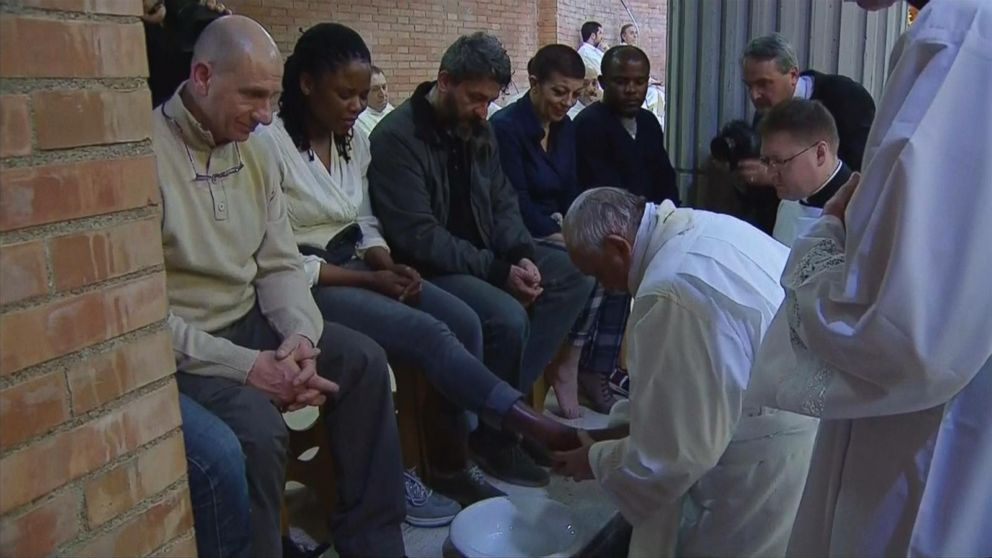 How about that “Francis effect!”
How about that “Francis effect!”
Here it is in words—excerpts from Peggy Noonan’s Saturday column in “The Wall Street Journal” . . .
“The pope I love embraces the hideously deformed man. He sees the modern world for what it is, ‘a field hospital after the battle . . . The thing the church needs most today is the ability to heal wounds’ . . . This pope fills my eyes with tears. He loves the poor. He pays his own hotel bill . . . The Francis I love is against materialism because he knows it is hollow and soul-crushing . . . He is for the little guy. . . [The] pope has captured the imagination of the world . . . [Francis] has filled the world with more than his portion of sweetness, and . . . has drawn the affection and regard of non-Catholics around the world.”
Why come? I watched the end of the pope’s Washington mass Saturday as thousands lined up for the Eucharist. I wished I could take a poll: “What is it about the pope that drew you to come today?” I couldn’t, of course. But in “Love for Pope Brings Them to the Streets, Not Necessarily to Church,” Zelda Caldwell wrote her findings of why some people came . . .
Coral Keegan, age 24, who lives in Washington, DC but is originally from New York, is a baptized Catholic, but not a regular churchgoer. She came because, “I like that he’s accepting of gays and lesbians, which the church didn’t do before.”
Does the pope make her want to go to Mass again? “No,” she said, “I don’t think it’s necessary for being a spiritual person.” Lying in the grass next to her, was Jorge Gonzalez, age 27, and originally from Colombia.
“I like how humble he is. He’s taken himself off a high, holy spot, and is showing himself as just a human being.” Raised a Catholic, Gonzalez doesn’t attend church regularly, and says that in spite of his positive feelings about the pope, he probably won’t start.
Jenna Porter, 24, from Massachusetts said, “Actually, I’m not Catholic, but I have a lot of admiration for the Holy Father. I’ve always been interested in religious studies even though I’m not religious. I think Pope Francis is a galvanizing figure. He’s a lot more optimistic, compassionate, and in touch with people than most leaders at his level. He’s an example of how religion can have a positive effect on people. ” She continued, “By sharing the original gospel that says treat people as you would have them treat you, he is himself a model of how to act as a human.”
The Crowds. Hundreds of thousands (over 800,000 attended his final mass in Philadelphia) greeted Pope Francis in Washington, D.C., in New York City and finally in Philadelphia. They waited, cheered, photographed, reached out and, when he ended his masses, they applauded. He called for children to come, kissed them on the head. He clearly enjoys being with people, but seems humbly unawed by his celebrity status. He preaches homilies of love, kindness, peace, tolerance, unity. Last year on Holy Thursday he washed the feet of 12 disabled and elderly people—women and non-Catholics among them —in a pre-Easter ritual designed to show his willingness to serve others like a “slave.”

Clearly there’s a longing in America, and maybe in the world, for positive, upbulding, hopeful words. We’re weary of negative news, restrictive regulations, and pessimistic predictions (or unkept political promises). So when someone of the pope’s stature makes us feel good, we eat it up. (Did you see the up-close camera shots of the audience while the pope spoke? Awe-struck. Hungry. Thirsty.) The “Francis effect.”
“Rocked” & Confused. But then I’m “rocked” like some in this 2013 “Huffington Post” article . . .
Pope Francis rocked some religious and atheist minds today when he declared that everyone was redeemed through Jesus, including atheists. During his homily at Wednesday Mass in Rome, Francis emphasized the importance of “doing good” as a principle that unites all humanity, and a “culture of encounter” to support peace.
Pope Francis went further in his sermon to say: “The Lord created us in His image and likeness, and we are the image of the Lord, and He does good and all of us have this commandment at heart: do good and do not do evil. All of us. ‘But, Father, this is not Catholic! He cannot do good.’ Yes, he can… “The Lord has redeemed all of us, all of us, with the Blood of Christ: all of us, not just Catholics. Everyone! ‘Father, the atheists?’ Even the atheists. Everyone!” We must meet one another doing good. ‘But I don’t believe, Father, I am an atheist!’ But do good: we will meet one another there.”
Then, this “Inquisitr” article from last year confuses me about Francis . . .
According to an article Now The End Begins, Pope Francis enforced this view that the only way to God cannot be done without the Virgin Mary and the Church of Rome. Without both, you are simply condemned to burn for all eternity in hell. The statement that Pope Francis uses that the article brings up is as follows:
“Dear friends, let us ask the Lord, through the intercession of the Virgin Mary, Mother of the Church, for the grace to never fall into the temptation of thinking we can make it without others, that we can get along without the Church, that we can save ourselves alone, of being Christians of the laboratory. On the contrary, you cannot love God without loving your brothers, you cannot love God outside of the Church; you cannot be in communion with God without being so in the Church.”
Simply going by that statement, there are three things that should be noted for what they state salvation should require. First, there needs to be an intercession of the Virgin Mary. Second, you cannot love God outside of the Church. And third, you cannot be in communion with God without being so in the Church. Going with the Holy Bible, there is no scripture that supports this. As a matter of fact, the article even goes further and states that Pope Francis is the False Prophet, mentioned in the book of Revelations.
However, such exclamations are not new with the Roman Catholic Church. For years, which also includes the years they slaughtered millions of Christians simply because they weren’t Catholic, they have expressed their agenda, as stated by Christian Beliefs (End Times Deceptions). According to their article, the most explicit statement about this came from Pope Eugene IV, in the Bull Cantate Domino in 1441, when he proclaimed ex cathedra:
“The Most Holy Roman Church firmly believes, professes and preaches that none of those existing outside the Catholic Church, not only pagans, also Jews, heretics, and schismatics can ever be partakers of eternal life, but that they are to go into the eternal fire ‘which was prepared for the devil and his angels’ unless before death they are joined with Her…
No one, let his alms giving be as great as it may, no one, even if he pour out his blood for the Name of Jesus Christ can be saved unless they abide within the bosom and unity of the Catholic Church.”
Affected? How should I evaluate the pope? How does all this affect the “Francis effect”? On one hand, he is the pope who embraces everyone and claims Christ redeemed all. He represents the Catholic doctrine that those outside the Catholic church cannot have eternal life.
Then there’s the “Vicar of Christ” doctrine. According to the Catholic Encyclopedia, “Vicar of Christ” is a title of the pope implying his supreme and universal primacy, both of honour and of jurisdiction, over the Church of Christ. It is founded on the words of the Divine Shepherd to St. Peter: “Feed my lambs. . . . Feed my sheep” (John 21:16-17), by which He constituted the Prince of the Apostles guardian of His entire flock in His own place, thus making him His Vicar and fulfilling the promise made in Matthew 16:18-19. (http://www.newadvent.org/cathen/15403b.ht). In other words, as the Vicar of Christ, the pope is the representative of Christ on earth with the same power and authority over the church Christ has.
Here are the passages. Read them and see if on their face they provide any basis for the Catholic interpretation.
Again Jesus said, “Simon, son of John, do you truly love me?” He answered, “Yes, Lord, you know that I love you.” Jesus said, “Take care of my sheep.” The third time he said to him, “Simon, son of John, do you love me?” Peter was hurt because Jesus asked him the third time, “Do you love me?” He said, “Lord, you know all things; you know that I love you.” Jesus said, “Feed my sheep” (John 21:16,17).
And I tell you that you are Peter, and on this rock I will build my church, and the gates of Hades will not overcome it. I will give you the keys of the kingdom of heaven; whatever you bind on earth will be bound in heaven, and whatever you loose on earth will be loosed in heaven” (Matthew 16:18,19).
Catholics claim that, according to these texts, Christ made Peter the leader of the apostles. Later Peter became the first bishop of Rome with authority over all other bishops and church leaders. Peter passed that apostolic authority on to the next bishop, who then passed it on to the next and so on. By this unbroken chain of Roman bishops, the Roman Catholic Church claims it is the true church.
So I ask again: How should I evaluate Pope Francis? On several key doctrines, I’m opposed. The “Vicar of Christ” teaching. Their doctrine of salvation. Relationally, I like the man. If I knew him personally, I think I would love him.
Doctrinally, I seem him as a product of his Catholic system. Most of us are. For 25 years I was a doctrinal product of the Pentecostal denomination in which I was raised and schooled. That didn’t make me a deceiver. Nor does it make the pope an intentional deceiver.
I certainly can’t oppose his love of people, especially for the poor, the imprisoned, the outcast. He embraces them as Christ did and as he taught us to. So much of what he said and did on this U.S. visit was a fresh-air breath of kindness, mercy and love.
I see in Pope Francis a man who genuinely loves God and neighbor. Though I disagree on key doctrines, I respect him and appreciate his pastoral warmth relationally. I want to focus on where we agree, not disagree. While acknowledging our important differences, I want to build him up in my speech, not tear him down.
Correct doctrine is vital. At the same time I must remember that God’s redeemed people through Christ includes more than those who adhere to my tenets of faith. And, holding to the doctrine of justification by grace alone through faith alone in Christ alone, I’m commanded to love my neighbor—even if he’s the pope!







Recent Comments